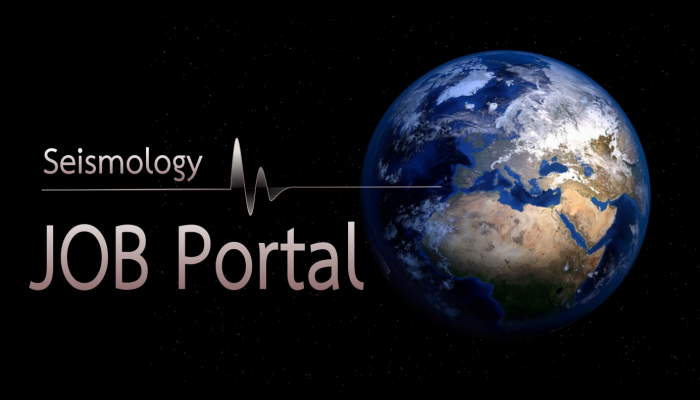On this page, we regularly update open positions in Seismology for early career scientists. Do you have a job on offer? Contact us at ecs-sm@egu.eu
Please, note that other available research positions are displayed on the EGU Jobs Portal.
Special Thanks to Eric Löberich for researching job postings for the ECS.
Latest open positions:
PhD positions
PhD at Royal Observatory of Belgium, Uccle, Belgium:
In the frame of the BRAIN-be 2.0 project BELSHAKE funded by the Belgian Science Policy Office, the Operational DirectorateSeismology & Gravimetry of the Royal Observatory of Belgium (ROB, http://seismologie.oma.be/en) is recruiting a PhD student to compile an earthquake ground-motion database for Belgium and to use these data to evaluate existing and develop new ground-motion models for application in Belgium. Click here for more information.
PhD at SMU, Dallas, TX, US:
We welcome applications from students with a Geophysics background, and from students with a related STEM background (e.g., Physics, Engineering) and an interest in developing and applying their skills to Geophysics problems. Click here for more information.
15 PhD postions across Europe:
Open Until: 2021-04-01. The SPIN „Monitoring a Restless Earth“ Innovative Training Network (ITN) is recruiting 15 highly motivated PhD students, or “Early-Stage Researchers” (ESRs). The positions will have staggered starting dates between March-October 2021 for a duration of 3 years.
SPIN is funded by the European Commission under the Horizon 2020 Marie Sklodowska-Curie Action (MSCA). SPIN brings together a network of excellent research departments, industrial partners, observatories, governmental organizations and risk modeling companies. Through this programme we strive to provide outstanding PhD training and to carry out cutting-edge research. Click here for more information.
PostDoc positions
Postdoctoral opportunity at Tufts Univesity, Massachusetts, US:
A postdoctoral scholar is invited to join a research group keenly interested in
(i) determining the mechanics of fault rupture at all stages of the seismic cycle
(ii) discovering to what extent our inferences are limited by available observations
(iii) identifying what these problems have in common with those in other fields of study
There is widespread recognition that fluids may play a role in facilitating or inhibiting fault slip. However, a complete understanding of that role requires observations to be interpreted by a transparent model of how fluids couple with the frictional strength of a fault, the deformation of the surrounding rock, and external loading. Click here for more information.
PostDoc at IPGP, France:
The objective is to conduct theoretical and experimental analyses of the Newtonian (gravity gradient) noise affecting gravity field measurements and associated with atmospheric disturbances and interactions between oceans and solid Earth. Our groups, APC and IPGP are involved in the detection of gravitational waves (GW) at frequencies higher than 100Hz and of the prompt gravity signal due to earthquake rupture at sub Hz frequencies. We detected for the first time a tiny gravity signal before the arrival of seismic waves during the Tohoku-Oki earthquake (March 11th, 2011, magnitude 9.0) (Montagner et al., Nature Com., 2016; Vallée et al., Science, 2017). While seismic waves propagate in the medium at a rate of a few kilometers per second, the gravitational field is modified almost instantaneously (at the speed of light). Applicants should submit a cover letter including a statement of interest, a curriculum vitae and the name and address of two persons of reference via email to:
Matteo Barsuglia (APC, barsu@apc.in2p3.fr) and
Jean-Paul Montagner (IPGP, jpm@ipgp.fr).
PostDoc at Géoazur, France:
Submarine landslides are an important hazard that affect the geomorphology of coastal areas and can trigger disastrous secondary effects, such as tsunamis. Submarine landslides can start naturally, but can also be triggered by earthquakes. The mechanisms of landslide triggering by earthquakes have been studied mostly empirically, and not sufficiently via quantitative models. Physics-based methods to assess this hazard are under-developed. The current project aims at filling this research gap by integrating modern computational capabilities in the modeling of earthquake source processes, wave propagation and initiation of shear instabilities in geomaterials.<a href="https://www.dropbox.com/s/eh5s3uex9o86hnk/DR2I_appel_candidature_Cerema_d21_AeroportNice_eng.pdf?dl=0" Click here for more information.
Postdoctoral Fellowship at JSPS, Japan:
JSPS Postdoctoral Fellowships for Research in Japan. Click here for more information.
Tenure Track positions
Tenure-track fixed-term employee at JAMSTEC, JAPAN:
The Marine Geology and Geophysics Research Group, Subduction Dynamics Research Center (SDR) (Director: Shuichi Kodaira), Research Institute for Marine Geodynamics (IMG), JAMSTEC is soliciting applications for a Scientist position. Subduction Dynamics Research Center (SDR), Research Institute for Marine Geodynamics (IMG) conducts marine geological and geophysical research with the aim of improving the current understanding of seismogenic zones, with a focus on the source regions for large earthquakes and tsunamis.
The successful applicant is expected to study the earthquake and tsunami records in these regions using state-of-the-art equipment and research vessels provided by JAMSTEC, and analyzing samples and data obtained through these research campaigns.
Click here for more information.
Technical and other positions
Director of Operations at University of Alaska Fairbanks, US:
Applicant review begins on Friday, March 5, 2021. We are hiring a Director of Operations to help lead the Alaska Earthquake Center in its mission blending science and public service. We seek an individual with the business and organizational experience to manage a team of two dozen scientists, engineers, and communication professionals. A background in science or engineering is an asset but is not required. We especially seek applicants with diverse (broadly defined) backgrounds that are historically underrepresented in STEM fields. This position is responsible for managing the staff, resources, and operations needed to make the Alaska Earthquake Center run effectively. The role works with the State Seismologist to meet those needs through new initiatives and ongoing funded projects. Click here for more information.

